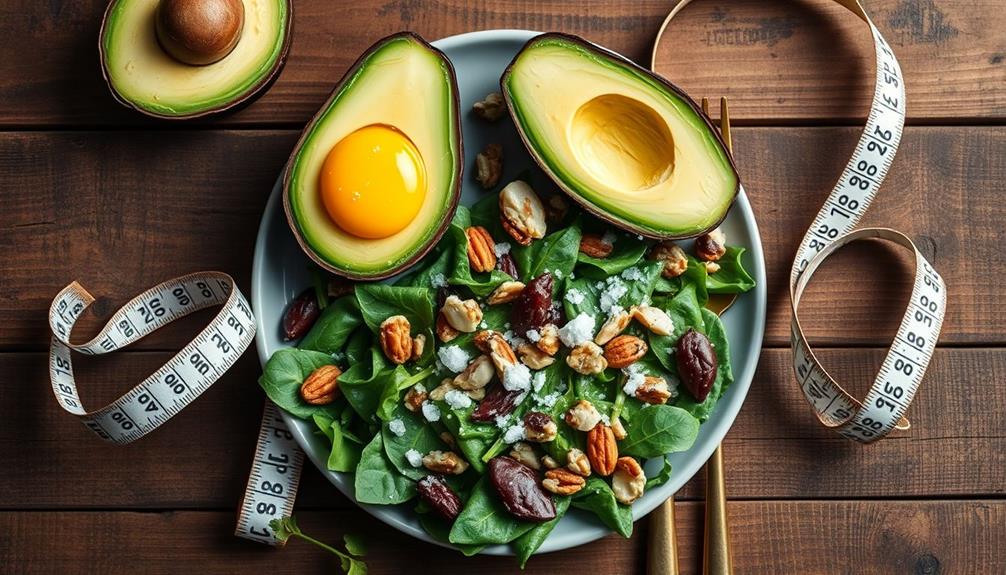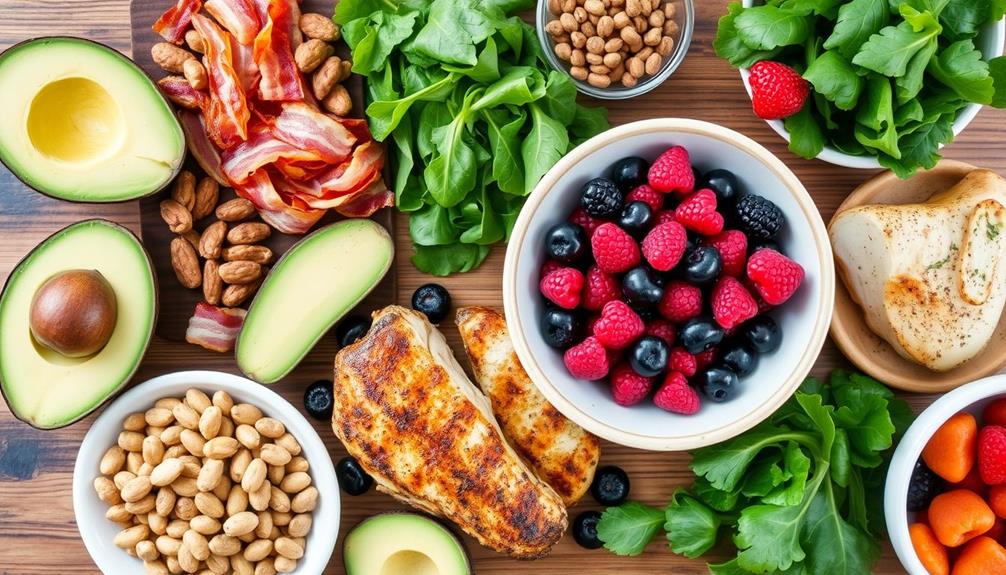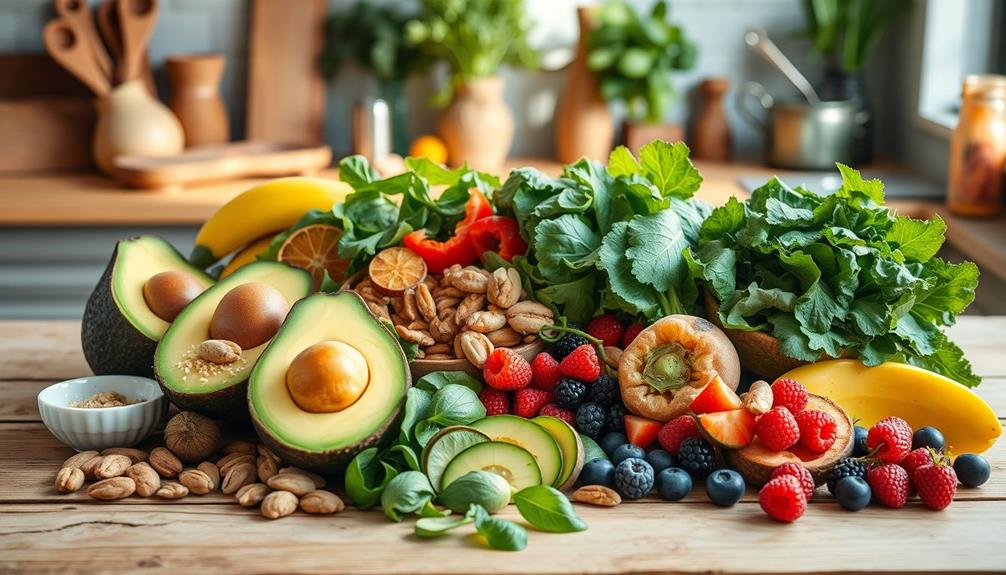When you're following a ketogenic diet as a woman, you'll typically need between 1,400 and 1,800 calories daily for effective weight loss. This range supports weight loss while ensuring you maintain the appropriate macronutrient balance—70-80% fat, 5-10% carbs, and 10-20% protein. Your exact caloric needs can depend on factors like age, activity level, and metabolic rate. To make sure you're on track, consider using tools like the Ketogains calculator to personalize your intake and monitor your progress. There's a lot more to discover about tailoring this lifestyle to your needs, so keep exploring.
Key Takeaways
- Women typically require 1,400 to 1,800 calories daily on a ketogenic diet for effective weight loss.
- A caloric intake of 1,600 to 2,400 calories is recommended for maintenance on keto.
- The keto macronutrient ratio is 70-80% fat, 15-30% protein, and 5-10% carbohydrates.
- Tracking caloric intake helps prevent unintentional weight gain and ensures adherence to keto guidelines.
- Tools like the Ketogains calculator can personalize caloric needs based on individual factors.
Overview of the Keto Diet
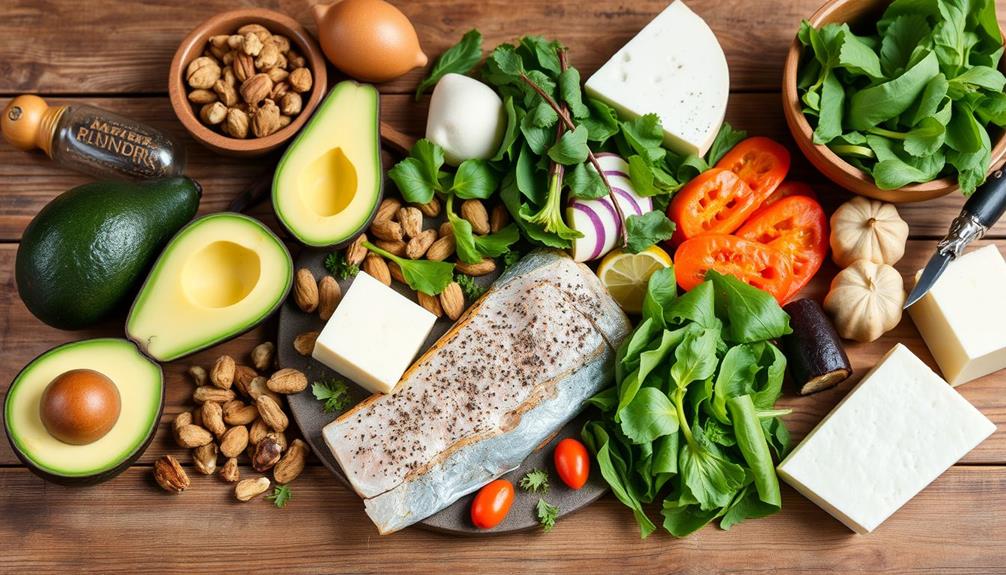
What exactly is the ketogenic diet? The keto diet's a low-carbohydrate, high-fat eating plan that typically consists of 70-80% fat, 5-10% carbohydrates, and 10-20% protein. To enter ketosis, you'll need to limit your carbohydrate intake to less than 50 grams per day. This restriction forces your body to burn fat for energy instead of relying on glucose. Incorporating effective strategies for weight loss can further enhance your results on the keto diet.
The popularity of the keto diet surged in the 1970s due to its impressive weight loss results and its historical use in treating medical conditions like epilepsy. When in ketosis, your body produces ketones from stored fat, which serve as an alternative energy source for your brain, even though it generally requires about 120 grams of glucose daily.
What sets the keto diet apart from other low-carb diets is its specific macronutrient ratio, which notably alters your metabolic processes and promotes fat burning.
With a focus on high-fat foods, this diet encourages you to enjoy avocados, nuts, and oils while avoiding sugar and starches. By understanding these fundamentals, you can better navigate your journey into the keto lifestyle.
Understanding Macronutrients

Macronutrients play an essential role in your success on the keto diet, as they determine how your body burns fuel. Understanding the right balance of macronutrients—fat, protein, and carbs—is key to achieving your health goals.
On a typical keto diet, about 70-80% of your calories come from fat, 15-30% from protein, and only 5-10% from carbohydrates. Consuming foods rich in antioxidants, like celery juice, can support your overall health while on this diet beneficial for overall health.
To maximize your results, keep these points in mind:
- Protein Intake: Aim for 0.6 to 1.0 grams of protein per pound of lean body mass to maintain muscle while in ketosis.
- Carbohydrate Limit: Keep your daily carb intake under 50 grams, focusing on non-starchy vegetables and avoiding sugars and grains.
- Caloric Awareness: Track the actual grams of food you consume, not just the percentages, to get a clearer picture of your macronutrient intake.
Daily Caloric Needs

Understanding your daily caloric needs is vital for effectively following a ketogenic diet. For women, the typical caloric intake ranges from 1,400 to 1,800 calories a day, depending on your activity level and metabolic requirements. If you're moderately active, you might need between 1,800 and 2,200 calories daily just to maintain your weight.
However, if weight loss is your goal, targeting a caloric intake of 1,200 to 1,500 calories can be beneficial. It's also important to take into account maintaining a balanced budget while managing your dietary choices, as this can lead to better financial health and support your overall wellness, akin to creating a personal budget.
To accurately determine your specific caloric needs, calculating your Total Daily Energy Expenditure (TDEE) is essential. This takes into account factors such as age, weight, height, and activity level.
If you're aiming to lose weight, creating a slight calorie deficit of about 500 calories per day can promote effective results while following a ketogenic diet.
Utilizing tools like the Ketogains calculator can help you further personalize your caloric intake and macronutrient breakdown. By understanding your daily caloric needs, you'll be better equipped to make informed decisions that support your keto journey and overall health goals.
Total Daily Energy Expenditure

To effectively manage your keto diet, understanding your Total Daily Energy Expenditure (TDEE) is essential. Your TDEE reflects the total calories you burn daily, influenced by factors like age, weight, height, and activity level.
This is important not only for weight management but also for considering how certain dietary choices, such as high-purine foods, can affect overall health. By calculating your TDEE, you can fine-tune your caloric intake for weight maintenance or loss on a keto plan, ensuring that you get the right balance of nutrients and energy for your lifestyle.
Additionally, cold medications may also play a role in how you feel while adhering to dietary changes.
Understanding TDEE Calculation
Total Daily Energy Expenditure (TDEE) encompasses all the calories your body burns in a day, combining your basal metabolic rate (BMR) with your physical activity levels. To calculate your TDEE, start by determining your BMR, which reflects the calories you burn at rest.
Understanding the significance of financial considerations for elderly care can also help when planning your overall health and nutrition budget. Then, multiply your BMR by an activity factor based on your lifestyle, ranging from sedentary to very active.
Here's what to take into account when calculating your TDEE:
- BMR Factors: Age, gender, weight, and height greatly impact your BMR.
- Activity Levels: Your daily routines, whether you're sedentary, moderately active, or very active, will alter your TDEE.
- Caloric Adjustment: Adjusting your caloric intake according to your TDEE can support weight loss, maintenance, or gain.
For example, a moderately active female might find her TDEE between 1,800 and 2,200 calories. If your goal is weight loss, think about a common recommendation of a 500-calorie deficit.
Regularly reassessing your TDEE is crucial since changes in weight, activity levels, or metabolism can affect your daily caloric needs.
Factors Influencing Caloric Needs
When calculating your caloric needs, several factors play a significant role in determining your Total Daily Energy Expenditure (TDEE). TDEE is the total number of calories burned daily and includes your basal metabolic rate (BMR) and activity levels.
For women, TDEE can range from about 1,600 to 2,400 calories per day, depending on age, weight, height, and how active you are. Understanding your caloric intake is essential, especially when considering risk management strategies for Bitcoin IRAs in a financial context, where maintaining a balanced approach can lead to better outcomes.
If you lead a sedentary lifestyle, you'll need fewer calories compared to someone who's more active. Even moderate activity can increase your caloric needs by about 10%.
To get a precise idea of your daily caloric needs, consider using online tools like the Body Weight Planner or the Ketogains calculator. These can help you tailor your intake for weight loss or maintenance effectively.
Understanding and calculating your TDEE is vital for establishing a sustainable calorie deficit on the keto diet. By doing this, you'll promote effective weight loss while ensuring you maintain a balanced nutritional intake.
Knowing your caloric needs empowers you to make informed choices on your keto journey.
Recommended Caloric Intake

When it comes to your caloric needs on a keto diet, it's important to remember that they can vary greatly based on individual factors like age, activity level, and weight loss goals.
Individuals with emotional dysregulation, such as those with Borderline Personality Disorder, may find that their eating habits are also influenced by their emotional states.
If you're aiming for weight loss, a caloric deficit of around 500 calories per day is generally recommended.
Keep in mind that your activity level can greatly influence how many calories you should consume for maintenance or weight loss.
Caloric Needs Vary Individually
Many women find that their caloric needs on a ketogenic diet can differ considerably based on personal factors. Understanding these variables is essential for effectively managing your weight loss journey.
Generally, the recommended caloric intake for women on a keto diet ranges from 1,400 to 1,800 calories per day. However, several key factors can influence your specific caloric needs:
– Age and weight: Younger women or those with higher body weight may require more calories.
Additionally, considering a diversified investment strategy such as gold IRAs can provide a secure financial future, paralleling your health goals.
- Activity level: Moderately active women often need 1,800 to 2,200 calories to maintain weight, while higher activity levels may necessitate an increase of about 10% to support energy expenditure.
- Metabolic rate: Your unique metabolic rate and hormonal balance play significant roles in determining how many calories you should consume.
For weight loss, you'll typically want to create a caloric deficit of around 500 calories.
Tools like the Body Weight Planner can help you calculate your personalized caloric needs based on these factors, ensuring you stay on track with your ketogenic diet goals.
Weight Loss Guidelines
To effectively manage weight loss on a ketogenic diet, women should aim for a caloric intake that aligns with their individual needs, typically ranging between 1,400 and 1,800 calories per day. This range depends on factors like age, activity level, and metabolic rate.
To promote weight loss, it's generally recommended to reduce your caloric intake by about 500 calories from your maintenance level, which can help you lose approximately 1 pound per week. Understanding your Total Daily Energy Expenditure (TDEE) is essential, as it guides your caloric needs based on your lifestyle.
For instance, a sedentary woman may need around 1,600-2,000 calories daily for maintenance. Keeping track of the calories you consume and ensuring they align with your goals is important for success on the keto diet and can be complemented by various earning methods to fund your health journey.
When planning your meals, consider your macros on Keto. A common breakdown for a 1,500-calorie diet might include about 125g of fat, 75g of protein, and only 19g of carbohydrates.
Activity Level Impact
Understanding how your activity level impacts your caloric needs is vital for success on the keto diet. Your daily caloric intake varies based on how active you are, which directly affects your energy needs and weight maintenance.
It's also important to take into account regular health screenings, such as mammography guidelines, especially for women, as they can play a significant role in early detection of potential health issues that may affect overall well-being.
Here's how different activity levels influence your caloric intake:
- Moderately Active: Aim for 1,800 to 2,200 calories per day.
- Sedentary: Consume fewer calories to avoid excess weight gain.
- Highly Active: If you engage in intense exercise, you may need up to 3,000 calories daily.
To promote weight loss, a caloric deficit of about 500 calories is generally recommended, bringing your intake to between 1,400 and 1,800 calories.
Adjusting your caloric intake based on your activity level guarantees you meet your energy needs while still working towards your weight goals. For example, if you increase your exercise intensity, think about raising your caloric intake by approximately 10%.
Caloric Guidelines for Weight Loss
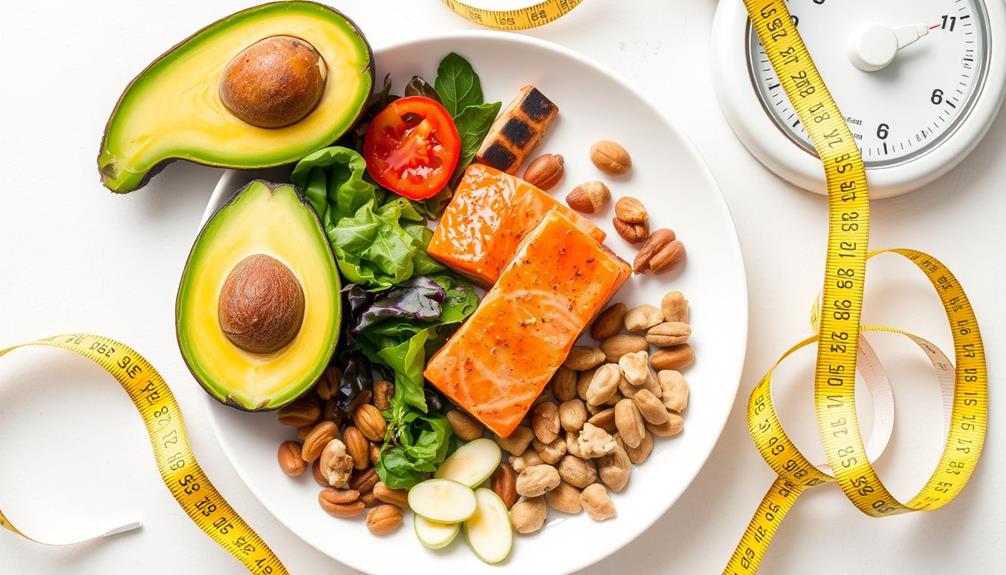
How can you determine the right caloric intake for weight loss on a ketogenic diet? For women, a typical caloric intake for weight loss generally ranges from 1,400 to 1,800 calories per day. This depends on individual factors like age, activity level, and metabolic rate.
To effectively lose weight, you'll want to reduce your intake by 500 to 750 calories from your daily needs. Additionally, understanding the impact of different food choices, such as the nutritional value of coffee, can support your weight loss journey while maintaining energy levels.
The ketogenic diet emphasizes a macro distribution of about 60-75% fat, 15-30% protein, and 5-10% carbohydrates. This distribution helps maintain a caloric deficit and promotes ketosis, which is essential for fat burning.
When planning your meals, be cautious of the high-fat foods you consume; it's easy to overshoot your caloric intake and sabotage your weight loss efforts. For instance, incorporating coffee culture into your diet can provide a satisfying, low-calorie beverage option.
To find out how many calories you can eat, consider using tools like the Ketogains calculator. It can help you figure out your personalized caloric needs and track your intake.
Maintaining Weight on Keto
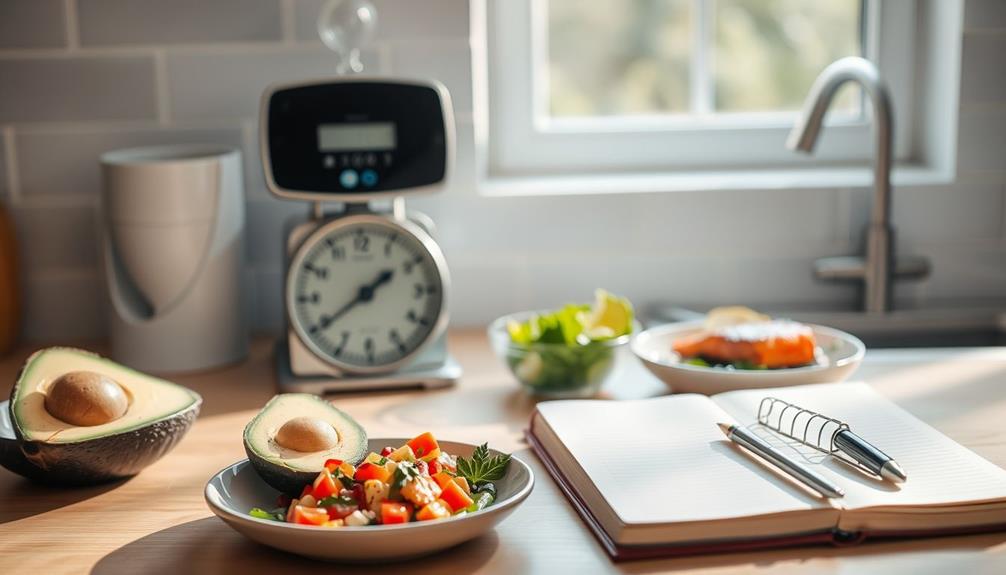
Maintaining weight on a ketogenic diet requires careful attention to your caloric intake and macronutrient balance. For women, typical caloric intake ranges from 1,600 to 2,400 calories on keto, depending on age, activity level, and individual metabolic needs.
To sustain your weight, aim for a macronutrient balance of about 60-75% fat, 15-30% protein, and 5-10% carbohydrates.
Here are some key points to keep in mind:
- Regularly calculate your Total Daily Energy Expenditure (TDEE) to determine your caloric needs.
- Focus on portion sizes, as even keto-friendly foods can lead to weight gain when consumed excessively.
- Incorporate a mix of aerobic and strength training exercises to boost calorie burn while staying within your keto guidelines.
Monitoring Caloric Intake
Monitoring your caloric intake is essential on the keto diet to guarantee you're not sabotaging your weight loss goals with high-fat foods.
Balancing your macronutrient intake while keeping track of your calories can help you maintain a healthy deficit, typically around 500 calories below your Total Daily Energy Expenditure.
Using tools like food tracking apps makes it easier to stay on track and avoid hidden carbs that could throw you off ketosis.
Importance of Caloric Tracking
Tracking your caloric intake is essential on a keto diet, as even healthy, high-fat foods can lead to unintended weight gain if consumed in excess. While low-carb foods can keep you satiated, it's important to be aware of how many calories you're consuming.
To effectively manage your weight loss, consider these key points:
- Daily Caloric Deficit: Aim for a daily caloric deficit of 500-750 calories to see significant weight loss.
- Monitor Macronutrients: Keep an eye on your macronutrients to guarantee you maintain ketosis while tracking your caloric intake.
- Identify Triggers: Regularly tracking can help you recognize patterns that lead to overeating, especially with calorie-dense items like cheese and nuts.
Utilizing apps like MyFitnessPal can simplify this process and help you align your daily caloric intake with your weight loss goals.
Balancing Macronutrient Intake
To succeed on a ketogenic diet, balancing your macronutrient intake is essential. Women typically aim for a caloric intake between 1,400 and 1,800 calories daily, depending on factors like age, activity level, and weight goals.
To maintain ketosis, you should endeavor for a macronutrient breakdown of 60-75% fat, 15-30% protein, and 5-10% carbohydrates. This balance not only supports fat loss but also optimizes your overall health.
Tracking your caloric intake can prevent you from consuming excessive amounts of calorie-dense foods, which are common in high-fat diets. Using tools like MyFitnessPal or the Ketogains calculator can help you accurately monitor your daily calorie and macronutrient goals, boosting your adherence to the ketogenic diet.
It's also vital to regularly assess and adjust your caloric intake based on your weight loss progress and energy levels.
Challenges in Caloric Management

Steering caloric management on a ketogenic diet can be quite challenging for many women. You may find yourself struggling to maintain your caloric intake while maneuvering through the complexities of high-fat foods. Overeating calorie-dense items like cheese, nuts, and avocados can quickly push you over your daily limits, so being mindful of portion sizes is essential.
Here are some common challenges you might face:
- Hidden carbohydrates: Processed foods can contain unexpected carbs, making it important to read labels carefully to stay within the recommended 20-50 grams for ketosis.
- Emotional eating: Feelings of deprivation or cravings can lead to emotional eating, complicating your caloric management efforts.
- Physical activity: A sedentary lifestyle can hinder your weight loss goals and make it tougher to maintain a calorie deficit.
Balancing these factors is critical to achieving success on the keto diet. By being aware of these challenges and adjusting your approach, you can better manage your caloric intake and work towards your health goals effectively.
Resources for Keto Success

Finding the right resources can make all the difference in your keto journey. To determine your daily caloric needs, you'll typically aim for between 1,400 to 1,800 calories, depending on factors like age, activity level, and metabolic health.
Using tools like the Ketogains calculator can help you find personalized caloric requirements tailored to your lifestyle and weight loss goals.
Tracking calories and macros is essential for staying on track. Apps like MyFitnessPal enable you to monitor your intake, ensuring it aligns with ketogenic guidelines. This accountability can make a significant impact on your success.
Meal planning is another key component. Referencing resources such as the green food list simplifies your process by highlighting keto-friendly options, helping you avoid unintentional carb intake.
Additionally, joining a community or subscribing to newsletters can provide ongoing support, recipes, and tips. Engaging with others on the same journey enhances your motivation and adherence to the keto diet.
Frequently Asked Questions
How Many Calories Should I Eat a Day to Lose Weight on Keto?
To lose weight on keto, you should aim for 1,400 to 1,800 calories daily. Focus on a macronutrient ratio of about 70-75% fat, 20-25% protein, and 5-10% carbohydrates to maintain ketosis effectively.
Is 1200 Calories Enough on Keto?
Is 1200 calories enough on keto? It can be for some, but it might not provide all the nutrients you need. Monitor your energy levels and adjust your intake to guarantee balanced macros and overall health.
How Many Calories Can a Woman Have on Keto?
You can't just guess your calorie intake on keto! Generally, women should aim for 1,400 to 1,800 calories daily. Tailor your needs based on age, weight, and activity for best results. Don't forget to track!
Do Calories Matter on a Keto Diet?
Yes, calories matter on a keto diet. You need to track your intake carefully, as consuming too many calories, even from keto-friendly foods, can stall your weight loss progress. Portion control is essential for success.
Conclusion
So, as you commence your keto journey, you might find it ironic that counting calories can feel like a weight off your shoulders—when it's really about the carbs, right? While you're busy enjoying those delicious fats, remember that understanding your caloric needs can make or break your success. It's a balancing act, but who knew losing weight could involve so much math? Embrace the challenge, and soon enough, you'll turn those numbers into triumph!
